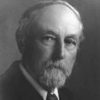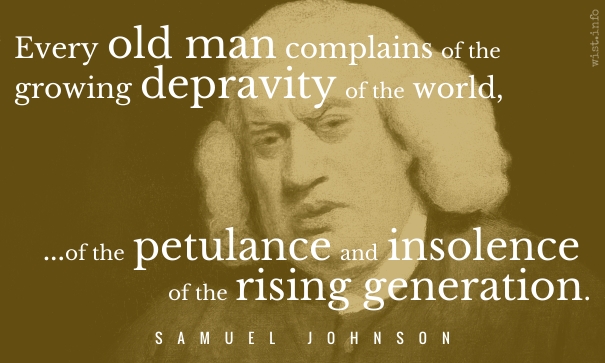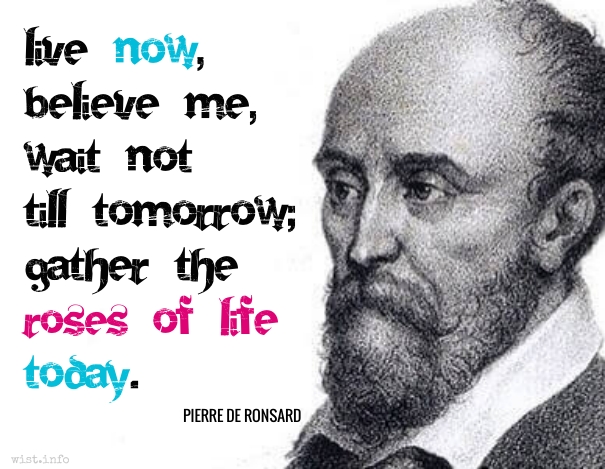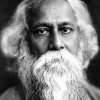Not in some cloister or cave,
Not in some kingdom above,
Here, on this side of the grave,
Here, should we labor and love.Ella Wheeler Wilcox (1850-1919) American author and poet.
“Here and Now.” st. 4, Custer and Other Poems (1896)
(Source)
Closing lines.
Quotations about:
present
Note not all quotations have been tagged, so Search may find additional quotes on this topic.
Horace and Aristotle already told us about the virtues of their forefathers and the vices of their times, and authors down through the centuries have spoken in like manner. If they had told the truth, men would nowadays be bears.
[Horace et Aristote nous ont déjà parlé des vertus de leurs pères, et des vices de leur temps, et les auteurs de siècle en siècle nous en ont parlé de même. S’ils avaient dit vrai, les hommes seraient à présent des ours.]Charles-Lewis de Secondat, Baron de Montesquieu (1689-1755) French political philosopher
Pensées Diverses [Assorted Thoughts], # 396 (1720-1755) [tr. Clark (2012)]
(Source)
(Source (French)). Alternate translation:Horace and Aristotle told us of the virtues of their fathers, and the vices of their own time, and authors down through the centuries have told us the same. If they were right, men would now be bears.
[E.g.]
FUTURE, n. That period of time in which our affairs prosper, our friends are true, and our happiness is assured.
Ambrose Bierce (1842-1914?) American writer and journalist
“Future,” The Cynic’s Word Book (1906)
(Source)
Included in The Devil's Dictionary (1911). Originally published in the "Devil's Dictionary" column in the San Francisco Wasp (1885-02-21).
The mill cannot grind with the water that’s past.
George Herbert (1593-1633) Welsh priest, orator, poet.
Jacula Prudentum, or Outlandish Proverbs, Sentences, &c. (compiler), # 153 (1640 ed.)
(Source)
A dramatist is one who believes that the pure event, an action involving human beings, is more arresting than any comment that can be made upon it. On the stage it is always now; the personages are standing on that razor edge, between the past and the future, which is the essential character of conscious being; the words are rising to their lips in immediate spontaneity. […] The theater is supremely fitted to say: “Behold! These things are.”
But in the days that are now passing over us, even fools are arrested to ask the meaning of them; few of the generations of men have seen more impressive days. Days of endless calamity, disruption, dislocation, confusion worse confounded: if they are not days of endless hope too, then they are days of utter despair. For it is not a small hope that will suffice, the ruin being clearly, either in action or in prospect, universal. There must be a new world, if there is to be any world at all!
Thomas Carlyle (1795-1881) Scottish essayist and historian
Latter-Day Pamphlets, # 1 “The Present Time” (1850-02-01)
(Source)
Pleasing for a moment is of some consequence; for, if we take care of the moments, the years will take care of themselves, you know.
Maria Edgeworth (1768-1849) Anglo-Irish writer, novelist
Mademoiselle Panache, Part 2 [Helen] (1795)
(Source)
It’s not about knowin where you are. It’s about thinkin you got there without takin anything with you. Your notions about startin over. Or anybody’s. You dont start over. That’s what it’s about. Every step you take is forever. You cant make it go away. None of it.
Cormac McCarthy (1933-2023) American novelist, playwright, screenwriter
No Country for Old Men (2005)
(Source)
Economists are surgeons who have an excellent scalpel but a jagged lancet — they operate exquisitely on the dead but torture the living.
[Les économistes sont des chirugiens qui on un excellent scalpel et un bistouri ébréché, opérant à merveille sur le mort et martyrisant le vif.]
Nicolas Chamfort (1741-1794) French writer, epigrammist (b. Nicolas-Sébastien Roch)
Products of Perfected Civilization [Produits de la Civilisation Perfectionée], Part 1 “Maxims and Thoughts [Maximes et Pensées],” ch. 7, ¶ 457 (1795) [tr. Dusinberre (1992)]
(Source)
(Source (French)). Alternate translations:Political Economists are surgeons with excellent scalpels and blunted bistouries; they work on the dead to a marvel and torture the living.
[tr. Mathers (1926)]An economist is a surgeon with an excellent scalpel and a rough-edged lancet, who operates beautifully on the dead and tortures the living.
[tr. Merwin (1969)]Economists are surgeons who wield an excellent scalpel and a chipped bistoury, and operate wonderfully on the dead flesh and agonize the living.
[tr. Pearson (1973)]Economists are surgeons who have an excellent scalpel and chipped scissors, who operate marvelously on the dead and who make martyrs of the living.
[tr. Siniscalchi (1994)]
Just as you drifted through an entire day without a plan and accomplished nothing, some people drift through their entire lives. They do it one day at a time, one week at a time, and one month at a time. The months run into years and span a life. It happens so gradually that they are unaware of how their lives are slipping by them until it’s too late.
As the Swiss inscription says: Sprechen ist silbern, Schweigen ist golden — “Speech is silvern, Silence is golden”; or, as I might rather express it: speech is of time, silence is of eternity.
Thomas Carlyle (1795-1881) Scottish essayist and historian
Sartor Resartus, Book 3, ch. 3 (1831)
(Source)
The past is never dead. It’s not even past.
William Faulkner (1897-1962) American novelist
Requiem for a Nun, Act 1, sc. 3 [Stevens] (1951)
(Source)
Sometimes misquoted as "The past isn't over. It isn't even past."
When we are children we seldom think of the future. This innocence leaves us free to enjoy ourselves as few adults can. The day we fret about the future is the day we leave our childhood behind.
Patrick Rothfuss (b. 1973) American author
The Name of the Wind, ch. 12 “Puzzle Pieces Fitting” (2007)
(Source)
We should not forget that our tradition is one of protest and revolt, and it is stultifying to celebrate the rebels of the past — Jefferson and Paine, Emerson and Thoreau — while we silence the rebels of the present.
Count heads. That is what matters in all things. When you must, follow the common taste, and make your way toward eminence. The wise should adapt themselves to the present, even when the past seems more attractive, both in the clothes of the soul and of the body. This rule for living holds for everything but goodness, for one must always practice virtue.
[El gusto de las cabeças haze voto en cada orden de cosas. Ésse se ha de seguir por entonces, y adelantar a eminencia. Acomódese el cuerdo a lo presente, aunque le parezca mejor lo pasado, así en los arreos del alma como del cuerpo. Sólo en la bondad no vale esta regla de vivir, que siempre se ha de practicar la virtud.]
Baltasar Gracián y Morales (1601-1658) Spanish Jesuit priest, writer, philosopher
The Art of Worldly Wisdom [Oráculo Manual y Arte de Prudencia], § 120 (1647) [tr. Maurer (1992)]
(Source)
(Source (Spanish)). Alternate translations:Let a prudent man accommodate himself to the present, whether as to body, or mind, though the past may even seem better unto him. In manners onely that rule is not to be observed, seeing vertue is at all times to be practised.
[Flesher ed. (1685)]In everything the taste of the many carries the votes; for the time being one must follow it in the hope of leading it to higher things. In the adornment of the body as of the mind adapt yourself to the present, even though the past appear better. But this rule does not apply to kindness, for goodness is for all time.
[tr. Jacobs (1892)]The choice of the many carries the vote in every field. For the time being, therefore, it must be bowed to, in order to bring it to higher level: the man of wisdom accommodates himself to the present, even though the past seems better, alike in the dress of his spirit, as in the dress of his body. Only in the matter of being decent does this rule of life not apply, for virtue should be practiced eternally.
[tr. Fischer (1937)]
If one were to write a book called “The Best Remedy against Self-Torment,” it would be very brief: “Let each day have trouble enough of its own.”
Søren Kierkegaard (1813-1855) Danish philosopher, theologian
Christian Discourses (Christelige Taler), Part 1 “The Cares of the Pagans,” ch. 6 (1848) [tr. Hong (1997)]
(Source)
The nation faces forward. It is made and remade every day. If we believe that the nation resides in the orderly recitations of history given to us by our leaders, then our story is over.
Timothy Snyder (b. 1969) American historian, author
The Red Prince, “Orange: European Revolutions” (2008)
(Source)
The present enables us to understand the past, not the other way round.
A. J. P. Taylor (1906-1990) British historian, journalist, broadcaster [Alan John Percivale Taylor]
“The Radical Tradition: Fox, Paine, and Cobbett,” The Trouble Makers: Dissent over Foreign Policy, 1792-1939 (1969)
(Source)
That’s what history is. It’s a conversation between the past and the present.
Lewis H. Lapham (b. 1935) American writer and editor
“The Art of Editing No. 4,” The Paris Review (Summer 2019)
(Source)
So oft as I with state of present time
The image of the antique world compare,
Whereas man’s age was in his freshest prime,
And the first blossom of faire vertue bare,
Such oddes I find twixt those and these which arc,
As that, through long continuance of his course,
Me seemes the world is runne quite out of square
From the first point of his appointed source;
And being once amiss, grows daily worse and worse: […]For that which all men then did vertue call,
Is now cald vice; and that which vice was hight,
Is now hight vertue, and so us’d of all;
Right now is wrong, and wrong that was is right.Edmund Spenser (c. 1552-1599) English poet
The Faerie Queene, Book 5, Proem, st. 1, 4 (1589-96)
(Source)
The greatest skill in cards is to know when to discard; the smallest of current trumps is worth more than the ace of trumps of the last game.
[La mejor treta del juego es saberse descartar: más importa la menor carta del triunfo que corre que la mayor del que pasó.]
Baltasar Gracián y Morales (1601-1658) Spanish Jesuit priest, writer, philosopher
The Art of Worldly Wisdom [Oráculo Manual y Arte de Prudencia], § 31 (1647) [tr. Jacobs (1892)]
(Source)
(Source (Spanish)). Alternate translations:The true skill at play, is to know how to discard. The lowest Card that turns up, is better than the highest of the former dealing.
[Flesher ed. (1685)]The great trick in cards lies in knowing what to discard: and the deuce of a suit that is trump, is more valuable than the ace of a suit that was.
[tr. Fischer (1937)]The trick is to know what cards to get rid of. The least card in the winning hand in front of you is more important than the best card in the losing hand you just laid down.
[tr. Maurer (1992)]
To you and me
Life is not full; we see
The good days fly
And, ah, how grievously
Their sum doth mount,
Set all to our account;
Why dally we
Who know what life should be?[Nunc vivit necuter sibi, bonosque
Soles effugere atque abire sentit,
Qui nobis pereunt et inputantur.
Quisquam vivere cum sciat, moratur?]Martial (AD c.39-c.103) Spanish Roman poet, satirist, epigrammatist [Marcus Valerius Martialis]
Epigrams [Epigrammata], Book 5, epigram 20 (5.20.11-14) (AD 90) [tr. Pott & Wright (1921)]
The phrase pereunt et imputantur (they [the days] pass by, and are put to our account) is often found on sundials.
"To Julius Martialis." (Source (Latin)).
Alternate translations:Now, to himself, alas! Does neither live,
But sees good suns, of which we are to give
A strict account, set, and march quick away:
Know a man how to live, and does he stay?
[tr. Cowley (1656)]We behold the good suns shine, and pass away; lost are they for ever, yet, nevertheless, they are counted in our reckoning. Is it possible that anyone who knows how to live delays to live accordingly?
[tr. Amos (1858), ch. 3, #14; identified as ep. 21]As it is, neither of us lives for himself, but sees his good days flee from him and vanish; days which are ever being lost to us, and set down to our account. Should any one, then, delay to live, when he knows how?
[tr. Bohn's Classical (1859)]Now neither lives unto himself, alas!
And the good suns we see, that flash and pass
And perish; and the bell that knells them cries,
"Another gone: O when will ye arise?"
[tr. Stevenson (1884)]Today neither lives for himself, and he feels the good days are flitting and passing away, our days that perish and are cored to our account. Does any man, when he knows how to live, delay?
[tr. Ker (1919)]Now neither of us truly lives at all.
Suns rise and set and swell the reckoning. Say,
Does life mean anything? Then live today.
[tr. Francis & Tatum (1924), #230, "To His Cousin"]Now neither lives his life, but he
Marks precious days that pass and flee.
These days are lost, but their amount
Is surely set to our account.
Knowledge the clue to life can give;
Then wherefore hesitate to live?
[tr. Duff (1929)]But as things are now, neither one of us
Lives for himself, while ever glorious
Days slip by unlived, never to come
Again, deducted always from that sum
Allotted us. Why then do we not live,
We who know the joys that life can give?
[tr. Marcellino (1968)]But as it is, we, both and each,
Miss the rich life within our reach,
We watch the good sun speed and set
And the lost day goes down as debt.
Would any man, if he knew how
To live, not do it here and now?
[tr. Michie (1972)]Now, twin lives are not our own.
Our good suns flee & disappear,
Debited, as they die, to us.
Who hesitates that's learned to live?
[tr. Whigham (1987)]We toil too much for others. Days
flicker by and then are billed,
one by one, to our accounts. Since we know
how, let's start really living now.
[tr. Matthews (1992)]We feel our good days slip away and leave us; they are wasted, and put to our account. Does any man, knowing the way to live, defer it?
[tr. Shackleton Bailey (1993)]Now neither lives
his life. We feel our good days flee,
Numbered and spent. Knowing the way
to live, why should a man delay.
[tr. McLean (2014)]As it is now, neither of us lives for his own benefit, each of us can feel his best days slipping away and leaving us behind. They're gone, they've been debited from our account. What kind of person knows how to live, but keeps putting it off?
[tr. Nisbet (2015)]
If you would understand your own age, read the works of fiction produced in it. People in disguise speak freely.
Arthur Helps (1813-1875) English writer and bureaucrat
Thoughts in the Cloister and the Cloud(1835)
(Source)
It’s a terrible thing, I think, in life to wait until you’re ready. I have this feeling now that actually no one is ever ready to do anything. There is almost no such thing as ready. There is only now. And you may as well do it now.
Hugh Laurie (b. 1959) English actor, writer, musician, singer
Interview with Sophie Harris, Time Out: New York (1 Sep 2012)
(Source)
To be hopeful in bad times is not just foolishly romantic. It is based on the fact that human history is a history not only of cruelty, but also of compassion, sacrifice, courage, kindness.
What we choose to emphasize in this complex history will determine our lives. If we see only the worst, it destroys our capacity to do something. If we remember those times and places — and there are so many — where people have behaved magnificently, this gives us the energy to act, and at least the possibility of sending this spinning top of a world in a different direction.
And if we do act, in however small a way, we don’t have to wait for some grand utopian future. The future is an infinite succession of presents, and to live now as we think human beings should live, in defiance of all that is bad around us, is itself a marvelous victory.
Howard Zinn (1922-2010) American historian, academic, author, social activist
“The Optimism of Uncertainty,” The Nation (2 Sep 2004)
(Source)
Adopted from Zinn's essay of the same name in Paul Loeb (ed.), The Impossible Will Take a Little While (2004). See also Zinn, "A Marvelous Victory" (23 Feb 2004).
Every old man complains of the growing depravity of the world, of the petulance and insolence of the rising generation. He recounts the decency and regularity of former times, and celebrates the discipline and sobriety of the age in which his youth was passed; a happy age which is now no more to be expected, since confusion has broken in upon the world, and thrown down all the boundaries of civility and reverence.
Samuel Johnson (1709-1784) English writer, lexicographer, critic
The Rambler, #50 (8 Sep 1750)
(Source)
Live now, believe me, wait not till tomorrow;
Gather the roses of life today.[Vivez, si m’en croyez, n’attendez à demain;
Cueillez dés aujourd’huy les roses de la vie.]
Pierre de Ronsard (1524-1585) French poet
“Quand vous serez bien vieille, au soir, à la chandelle,” l. 13, Sonnets pour Hélène (1578)
(Source)
We can draw lessons from the past, but we cannot live in it.
Lyndon B. Johnson (1908-1973) American politician, educator, US President (1963-69)
Speech (1963-12-13), Consumer Advisory Council, Washington, D.C.
(Source)
There are many fine things which you mean to do some day, under what you think will be more favorable circumstances. But the only time that is surely yours is the present, hence this is the time to speak the word of appreciation and sympathy, to do the generous deed, to forgive the fault of a thoughtless friend, to sacrifice self a little more for others. Today is the day in which to express your noblest qualities of mind and heart, to do at least one worthy thing which you have long postponed, and to use your God-given abilities for the enrichment of some less fortunate fellow traveler. Today you can make your life big, broad, significant and worthwhile. The present is yours to do with it as you will.
Pry not, the morrow’s chance to learn:
Set down to gain whatever turn
The wheel may take.
[Quid sit futurum cras, fuge quaerere, et
quem fors dierum cumque dabit, lucro
adpone.]Horace (65-8 BC) Roman poet and satirist [Quintus Horacius Flaccus]
Odes [Carmina], Book 1, # 9, l. 13ff (1.9.13-15) (23 BC) [tr. Gladstone (1894)]
(Source)
To Thaliarchus.
(Source (Latin)). Alternate translations:Upon to Morrow reckon not,
Then if it comes 'tis clearly got.
[Fanshaw (1666)]All Cares, and Fears are fond and vain,
Fly vexing thoughts of dark to-morrow;
What Chance scores up, count perfect gain,
And banish business, banish sorrow.
[tr. Creech (1684)]To-morrow and her works defy,
Lay hold upon the present hour,
And snatch the pleasures passing by,
To put them out of fortune's power:
[tr. Dryden (c. 1685)]O, ask not what the morn will bring,
But count as gain each day that chance
May give you.
[tr. Conington (1872)]Avoid inquiring what may happen to-morrow; and whatever day fortune shall bestow on you, score it up for gain.
[tr. Smart/Buckley (1853)]Let not to-morrow's change or chance
Perplex thee, but as gain
Count each new day!
[tr. Martin (1864)]Shun to seek what is hid in the womb of the morrow;
Count the lot of each day as clear gain in life’s ledger.
[tr. Bulwer-Lytton (1870)]What brings to-morrow care not to ask, and what
Fortune each day may bring, set it down as gain.
[tr. Phelps (1897)]What is to be to-morrow do not ask: appraise
As gain the course of days Fortune will yield.
[tr. Garnsey (1907)]What next morn's sun may bring, forbear to ask;
But count each day that comes by gift of chance
So much to the good.
[tr. Marshall (1908)]Cease to ask what the morrow will bring forth, and set down as gain each day that Fortune grants!
[tr. Bennett (Loeb) (1912)]Ask not the morrow's good or ill;
Reckon it gain however chance
May shape each day.
[tr. Mills (1924)]Try not to guess what lies in the future, but
As Fortune deals days enter them into your
Life's book as windfalls, credit items,
Gratefully.
[tr. Michie (1963)]Stop wondering after tomorrow: take
Day by day the days you’re granted.
[tr. Raffel (1983)]Cease to ask what tomorrow may bring
and count as gain whatever Fortune grants you today.
[tr. Alexander (1999)]Don’t ask what tomorrow brings, call them your gain
whatever days Fortune gives.
[tr. Kline (2015)]Leave off asking what tomorrow will bring, and
whatever days fortune will give, count them
as profit.
[tr. Wikisource (2021)]
The secret of health for both mind and body is not to mourn for the past, worry about the future, or anticipate troubles, but to live in the present moment wisely and earnestly.
The whole lesson of my life has been that no ‘methods of stimulation’ are of any lasting use. They are indeed like drugs — a stronger dose is needed each time and soon no possible dose is effective. We must not bother about thrills at all. Do the present duty — bear the present pain — enjoy the present pleasure — and leave emotions and ‘experiences’ to look after themselves.
Philosophy easily triumphs over past ills and ills to come, but present ills triumph over philosophy.
[La philosophie triomphe aisément des maux passés et des maux à venir; mais les maux présents triomphent d’elle.]
François VI, duc de La Rochefoucauld (1613-1680) French epigrammatist, memoirist, noble
Réflexions ou sentences et maximes morales [Reflections; or Sentences and Moral Maxims], ¶22 (1665-1678) [tr Tancock (1959)]
(Source)
(Source (French)). French variants:La philosophie triomphe aisément des maux passés et de ceux qu’un ne sont pas prêts d’arriver; mais les maux présents triomphent d'elle.
(1665)]La philosophie ne fait des merveilles que contre les maux passés ou contre ceux qui ne sont pas prêts d’arriver, mais elle n’a pas grande vertu contre les maux présents.
[Manuscript]
Alternate English translations:Philosophy may easily triumph over Evils past, as also over those not yet ready to assault a man; but the present triumph over it.
[tr. Davies (1669), ¶87]Philosophy finds it an easie matter to vanquish past and future Evils, but the present are commonly too hard for it.
[tr. Stanhope (1694), ¶23]Philosophy easily triumphs over past and future ills; but present ills triumph over philosophy.
[pub. Donaldson (1783), "Ills" ¶242]Philosophy easily triumphs over ills both past and future; but present ills triumph over philosophy.
[ed. Carville (1835), "Ills" ¶211]Philosophy easily triumphs over past and future ills: but religion only triumphs over the present ones.
[ed. Carville (1835), "Philosophers" ¶303]Philosophy triumphs easily over past, and over future evils, but present evils triumph over philosophy.
[ed. Gowens (1851), ¶23]Philosophy triumphs easily over past evils and future evils; but present evils triumph over it.
[tr. Bund/Friswell (1871)]Philosophy easily masters past and future ills, but the sorrow of the moment is the master of philosophy.
[tr. Heard (1917)]Philosophy easily conquers both past and future misfortunes, but is conquered by the misfortunes of the moment.
[tr. Stevens (1939)]Philosophy can easily triumph over past misfortunes and over those that lie ahead: but the misfortunes of the present will triumph over our philosophy.
[tr. FitzGibbon (1957)]Philosophy triumphs with ease over misfortunes past and to come, but present misfortunes triumph over it.
[tr. Kronenberger (1959)]Philosophy triumphs easily over past and future evils; but present evils triumph over it.
[tr. Whichello (2016)]
Mary, my sweet, carpe that old diem! — it’s the only game in town.
Robert A. Heinlein (1907-1988) American writer
Methuselah’s Children [Lazarus Long] (1958)
See Horace.
Lead, kindly Light, amid the encircling gloom,
Lead Thou me on;
The night is dark, and I am far from home;
Lead Thou me on!
Keep Thou my feet; I do not ask to see
The distant scene; — one step enough for me.John Henry Newman (1801-1890) English prelate, Catholic Cardinal, theologian
“Lead, Kindly Light” (16 Jun 1833)
(Source)
Great as our differences are, all of us — professors, politicians, preachers — would no doubt find that we had much in common after all if it were possible to meet in the flesh some distinguished representatives from a former age.
But we live through the fine days without noticing them; only when we fall on evil ones do we wish to have back the former. With sour faces we let a thousand bright and pleasant hours slip by unenjoyed and afterwards vainly sigh for their return when times are trying and depressing. Instead of this, we should cherish every present moment that is bearable, even the most ordinary, which with such indifference we now let slip by, and even with impatience push on.
[Aber wir verleben unsre schönen Tage, ohne sie zu bemerken: erst wann die schlimmen kommen, wünschen wir jene zurück. Tausend heitere, angenehme Stunden lassen wir, mit verdrießlichem Gesicht, ungenossen an uns vorüberziehn, um nachher, zur trüben Zeit, mit vergeblicher Sehnsucht ihnen nachzuseufzen. Statt dessen sollten wir jede erträgliche Gegenwart, auch die alltägliche, welche wir jetzt so gleichgültig vorüberziehn lassen, und wohl gar noch ungeduldig nachschieben.]
Arthur Schopenhauer (1788-1860) German philosopher
Parerga and Paralipomena, Vol. 1, “Aphorisms on the Wisdom of Life [Aphorismen zur Lebensweisheit],” ch. 5 “Counsels and Maxims [Paränesen und Maximen],” § 2.5 (1851) [tr. Payne (1974)]
(Source)
(Source (German)). Alternate translation:But we live through our days of happiness without noticing them; it is only when evil comes upon us that we wish them back. A thousand gay and pleasant hours are wasted in ill-humor; we let them slip by unenjoyed, and sigh for them in vain when the sky is overcast. Those present moments that are bearable, be they never so trite and common, -- passed by in indifference, or, it may be, impatiently pushed away.
[tr. Saunders (1890)]
The secret of health for both mind and body is not to mourn for the past, worry about the future, or anticipate troubles, but to live in the present moment wisely and earnestly.
TURHAN: The past tempts us, the present confuses us, and the future frightens us. And our lives slip away, moment by moment, lost in that vast, terrible in-between.
Therefore, two bad habits must be forbidden, both the fear of the future and the memory of by-gone trouble; the latter no longer belongs to me, the former, not yet.
Ask counsel of both times — of the ancienter time what is best, and of the latter time what is fittest.
Francis Bacon (1561-1626) English philosopher, scientist, author, statesman
“Of Great Place,” Essays, No. 11 (1625)
(Source)
Who are you, reader, reading my poems an hundred years hence?
I cannot send you one single flower from this wealth of the spring, one single streak of gold from yonder clouds.
Open your doors and look abroad.
From your blossoming garden gather fragrant memories of the vanished flowers of an hundred years before.
In the joy of your heart may you feel the living joy that sang one spring morning, sending its glad voice across a hundred years.
Rabindranath Tagore (1861-1941) Indian Bengali poet, philosopher [a.k.a. Rabi Thakur, Kabiguru]
The Gardener, #85 (1915)
(Source)
I am old, but I certainly have not that sign of old-age, extolling the past at the expense of the present.
Sydney Smith (1771-1845) English clergyman, essayist, wit
Memoir of the Reverend Sydney Smith, by His Daughter, Lady Holland, Vol. 1, ch. 11 (1855)
(Source)
ULYSSES: Those scraps are good deeds past, which are devoured
As fast as they are made, forgot as soon
As done. Perseverance, dear my lord,
Keeps honor bright. To have done is to hang
Quite out of fashion like a rusty mail
In monumental mock’ry.William Shakespeare (1564-1616) English dramatist and poet
Troilus and Cressida, Act 3, sc. 3, l. 153ff (3.3.153-158) (1602)
(Source)
We know nothing of tomorrow; our business is to be good and happy today.
Sydney Smith (1771-1845) English clergyman, essayist, wit
Memoir of the Reverend Sydney Smith, by His Daughter, Lady Holland, Vol. 1, ch. 12 (1855)
(Source)
To complain of the age we live in, to murmur at the present possessors of power, to lament for the past, to conceive extravagant hopes of the future, are the common dispositions of the greatest part of mankind.
The mind is never satisfied with the objects immediately before it, but is always breaking away from the present moment, and losing itself in schemes of future felicity …. The natural flights of the human mind are not from pleasure to pleasure, but from hope to hope.
Samuel Johnson (1709-1784) English writer, lexicographer, critic
The Rambler, #2 (24 Mar 1750)
(Source)
Our ignorance of history makes us calumniate our own time. We have always been like this. Some calm years have deceived us. That is all. I too believed in the softening of manners. We must erase this error and esteem ourselves no more than people esteemed themselves in the time of Pericles or Shakespeare, atrocious epochs in which fine things were done.
[On a toujours été comme ça. Quelques années de calme nous ont trompés. Voilà tout. Moi aussi, je croyais à l’adoucissement des mœurs. Il faut rayer cette erreur et ne pas s’estimer plus qu’on ne s’estimait du temps de Péricles ou de Shakespeare, époques atroces où on a fait de belles choses.]
Gustave Flaubert (1821-1880) French writer, novelist
Letter to George Sand (8 Sep 1871) [tr. Tarver]
(Source)
Original French.
Alternate translation: "Our ignorance of history causes us to slander our own times."
ARCHBISHOP:O thoughts of men accursed!
Past and to come seems best; things present, worst.William Shakespeare (1564-1616) English dramatist and poet
Henry IV, Part 2, Act 1, sc. 3, l. 112ff (1.3.112-113) (c. 1598)
(Source)
If the Party could thrust its hand into the past and say of this or that event, it never happened — that, surely, was more terrifying than mere torture and death? The Party said that Oceania had never been in alliance with Eurasia. He, Winston Smith, knew that Oceania had been in alliance with Eurasia as short a time as four years ago. But where did that knowledge exist? Only in his own consciousness, which in any case must soon be annihilated. And if all others accepted the lie which the Party imposed — if all records told the same tale — then the lie passed into history and became truth. “Who controls the past,” ran the Party slogan, “controls the future: who controls the present controls the past.”
George Orwell (1903-1950) English writer [pseud. of Eric Arthur Blair]
Nineteen Eighty-Four (1949)
(Source)
Sometimes paraphrased, "He who controls the past controls the future. He who controls the present controls the past."
I have no use for the strictures of You must. You must not.
[無可無不可]
Confucius (c. 551- c. 479 BC) Chinese philosopher, sage, politician [孔夫子 (Kǒng Fūzǐ, K'ung Fu-tzu, K'ung Fu Tse), 孔子 (Kǒngzǐ, Chungni), 孔丘 (Kǒng Qiū, K'ung Ch'iu)]
The Analects [論語, 论语, Lúnyǔ], Book 18, verse 8 (18.8.5) (6th C. BC) [ed. Lao-Tse, tr. Hinton (1998)]
(Source)
(Source (Chinese)). Alternate translations:I have no course for which I am predetermined, and no course against which I am predetermined.
[tr. Legge (1861)]I will take no liberties, I will have no curtailing of my liberty.
[tr. Jennings (1895); in the footnote he gives a more raw translation, "Without possibilities (or freedom to act) -- without impossibilities"]With me there is no inflexible "thou shalt" or 'thou shalt not."
[tr. Soothill (1910)]I have no categoric can and cannot.
[tr. Pound (1933)]I have no "thou shalt" or "thou shalt not."
[tr. Waley (1938)]I accept life as it comes. [tr. Ware (1950)]I have no preconceptions about the permissible and the impermissible.
[tr. Lau (1979)]I avoid saying what should or should not be done.
[tr. Dawson (1993)]I follow no rigid prescriptions on what should, or should not, be done.
[tr. Leys (1997)]I have neither favorable nor unfavorable situation. [tr. Huang (1997)]I have not any stubborn positiveness or negation.
[tr. Cai/Yu (1998)]I do not have presuppositions as to what may and may not be done.
[tr. Ames/Rosemont (1998)]I have no "may" and no "may not."
[tr. Brooks/Brooks (1998)]I have no preconceptions about what one can or cannot do.
[tr. Annping Chin (2014)]
This may be the source of Lin-Yutang, ed. The Wisdom of Confucius (1938):The superior man goes through his life without any one preconceived course of action or any taboo. He merely decides for the moment what is the right thing to do.
Reflect upon your present blessings — of which every man has many — not on your past misfortunes, of which all men have some. Fill your glass again, with a merry face and contented heart. Our life on it, but your Christmas shall be merry, and your new year a happy one!
Charles Dickens (1812-1870) English writer and social critic
Sketches by Boz, “Characters,” ch. 2 “A Christmas Dinner” (1833-36)
(Source)
The longest liver and he who will die soonest lose just the same. For the present is the only thing of which a man can be deprived, if it is true that this is the only thing which he has, and that a man cannot lose a thing if he has it not.
Marcus Aurelius (AD 121-180) Roman emperor (161-180), Stoic philosopher
Meditations, Book 2, #14 [tr. Long (1862)]
(Source)
Alternate translations:
- "That life which any the longest liver, or the shortest liver parts with, is for length and duration the very same, for that only which is present, is that, which either of them can lose, as being that only which they have; for that which he hath not, no man can truly be said to lose." [tr. Casaubon (1634), #12]
- "When the longest and shortest lived persons come to die, their loss is equal: for as I observe, the present is their all, and they can suffer no farther." [tr. Collier (1701)]
- "When the longest and shortest-lived persons come to die, their loss is equal; they can but lose the present as being the only thing they have; for that which he has not, no man can be truly said to lose." [tr. Zimmern (1887)]
- "The longest-lived and the shortest-lived man, when they come to die, lose one and the same thing." [tr. Morgan, in Bartlett's Familiar Quotations (1894)]
- "The longest-lived and the soonest to die have an equal loss; for it is the present alone of which either will be deprived, since (as we saw) this is all he has and a man does not lose what he has not got." [tr. Farquharson (1944)]
- "When the longest- and shortest-lived of us come to die, their loss is precisely equal. For the sole thing of which any man can be deprived is the present; since this is all he owns, and nobody can lose what is not his." [tr. Staniforth (1964)]
- "The longest-lived and those who will die soonest lose the same thing. The present is all that they give up, since that is all you have, and what you do not have, you cannot lose." [tr. Hays (2003)]
“When you wake up in the morning, Pooh, what’s the first thing you say to yourself?”
“What’s for breakfast?” said Pooh. “What do you say, Piglet?”
“I say, I wonder what’s going to happen exciting today?” said Piglet.
Pooh nodded thoughtfully.
“It’s the same thing,” he said.
In the moment of our talking, envious time has ebb’d away.
Seize the present; trust tomorrow e’en as little as you may.
[Dum loquimur, fugerit invida
aetas: carpe diem, quam minimum credula postero.]Horace (65-8 BC) Roman poet and satirist [Quintus Horacius Flaccus]
Odes [Carmina], Book 1, # 11, l. 8ff (1.11.8-9) (23 BC) [tr. Conington (1872)]
Often titled "To Leuconoë." This is the source of the famous phrase, "carpe diem," commonly translated "seize the day." Many scholars give it a more horticultural spin, to harvest the day now, while it is ripe. More discussion here. More quotations along this theme here.
(Source (Latin)). Alternate translations:Whilest we are talking, envious Time doth slide:
This day's thine own, the next may be deny'd.
[tr. Sir T. H.; ed. Brome (1666)]Time, while we speak on't flyes; now banish sorrow,
Live well to day, and never trust to morrow.
[tr. S. W., Esq.; ed. Brome (1666)]E'en whil'st we speak the Envious time
Doth make swift hast away,
Then seize the present, use thy prime,
Nor trust another Day.
[tr. Creech (1684)]While we are conversing, envious age has been flying; seize the present day, not giving the least credit to the succeeding one.
[tr. Smart/Buckley (1853)]Use all life's powers,
The envious hours
Fly as we talk ; then live to-day,
Nor fondly to to-morrow trust more than you must and may.
[tr. Martin (1864)]While we talk, grudging Time will be gone, and a part of ourselves be no more.
Seize to-day -- for the morrow it is in which thy belief should be least.
[tr. Bulwer-Lytton (1870)]Our span is brief. The niggard hour,
in chatting, ebbs away;
Trust nothing for to-morrow's sun:
make harvest of to-day.
[tr. Gladstone (1894)]E'en while we speak, envious life will fly; --
So make use of to-day, trusting the next, little as possible.
[tr. Phelps (1897)]While we are talking envious time steals on:
Catch to-day's joy and give the morrow but a minimum of trust.
[tr. Garnsey (1907)]Ev'n as we speak, grim Time
speeds swift away;
Seize now and here the hour that is. nor trust
some later day!
[tr. Marshall (1908)]Even while we speak, envious Time has sped. Reap the harvest of to-day, putting as little trust as may be in the morrow!
[tr. Bennett (Loeb) (1912)]E'en while we speak time, grudging time, has fled; snatch eagerly
Each day, and trust the morrow's grace as little as may be.
[tr. Mills (1924)]Even while
We talk Time, hateful, runs a mile.
Don't trust tomorrow's bough
For fruit. Pluck this, here, now.
[tr. Michie (1963)]Time goes running, even
As we talk. Take the present, the future's no one's affair.
[tr. Raffel (1983)]Now as I say these words,
Time has already fled
Backwards away --
Leuconoe --
Hold on to the day.
[tr. Ferry (1997)]While we converse, envious time will have vanished: harvest
Today, placing the least credence on what’s to come.
[tr. Willett (1998)]Even as we speak, envious Time is fleeing.
Seize the day: entrusting as little as possible to tomorrow.
[tr. Alexander (1999)]The envious moment is flying now, now, while we’re speaking:
Seize the day, place in the hours that come as little faith as you can.
[tr. Kline (2015)]While we are speaking, envious life
will have fled: seize the day, trusting the future as little as possible.
[tr. Wikisource (2021)]


































































